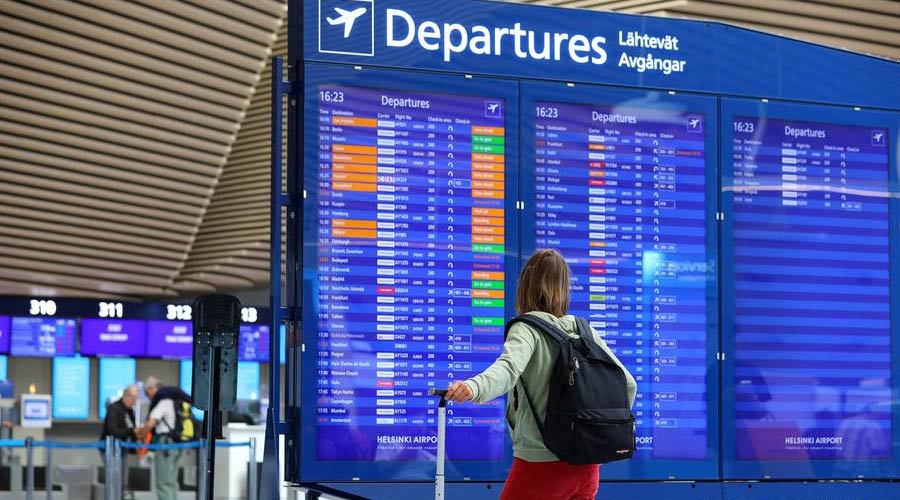There is considerable uncertainty about the new year among people who work in the travel industry. "Due to the overall situation as this moment, it is difficult to make a reliable prediction about the future," the German Travel Association (DRV) told DW. "The war in Ukraine, inflation and growing energy costs dampen the outlook."
This uncertainty is compounded by a change in booking and travel patterns. Since the outbreak of the pandemic, there has been a growing tendency to make last-minute bookings, according to the DRV. This can be explained by constantly changing travel rules and restrictions during the height of the pandemic, which made long-term holiday planning challenging.
External factor shape travel preferences
Professor Ulrich Reinhardt, who heads the Foundation for Future Studies, analyses how external factors shape our travel behavior. He says it is influenced by the prevailing circumstances and encompasses immediate factors such as "inflation, the coronavirus, and the war in Ukraine" but also more fundamental ones like digitalization, globalization and climate change.
Nevertheless, "for a majority of Germans, vacation season is the best time of the year," Reinhardt tells DW. "It means rest and recovery, and provides an opportunity to forget about the stressful humdrum of everyday life." He is certain many Germans will continue traveling for this very reason.
Camping holidays make comeback
The pandemic and related travel restrictions sparked a veritable camping renaissance in Germany, says Reinhardt, as this form of open-air holiday offers low infection risk and maximum freedom. That said, he does not foresee all Germans flocking to campsites in the future. He thinks these holidays will appeal only to a segment of the population, just as biking trips, hiking holidays, surf or camper van vacations don't appeal to everyone. "The vast majority of Germans will still want to lounge on a beach, or poolside, eat well and disconnect from their everyday lives," predicts Reinhardt.
Yet the COVID pandemic has also increased our yearning for security, he says. "Safety will be a crucial factor while on vacation, not just in terms of terrorist attacks or crime, but also with regard to one's personal health," says Reinhardt. Even so, the desire to see new places and meet new people remains. "The pandemic forced us to seriously restrict our leisure activities, our travel and interactions with others — and while we temporarily adjusted to these restrictions, our basic human need to socialize, communicate and connect remains, especially on holiday."
While climate change is increasingly present in public discourse, it is having little influence on how we choose to travel. Wolfgang Strasdas, head researcher at the Center for Sustainable Tourism at Eberswalde University of Applied Sciences, says, "There has been a broad awareness of sustainability [in the world of travel] and it is growing." Even so, this awareness is "not entirely reflected in our travel behavior." He says environmental concerns still only have a marginal impact on planning and booking holidays.
Sustainable travel
This is echoed by the German Travel Association (DRV), which says one can detect a "certain discrepancy between the expressed desire for sustainable travel and actual bookings." The organization says surveys show many people want to travel sustainably, yet only a tiny fraction put their money where their mouth is.
The DRV expects long-distance travel and cruise holidays will be in great demand next year, even though both are particularly damaging to the environment. "Even in 2022, certain far away destinations like the Maldives and the Dominican Republic were very popular, sometimes even in higher demand than before the pandemic," says the DRV.
As such, respective holiday budgets will most likely be the key factor in determining whether and where people travel next year. Henrike Beer of the Holiday and Travel Research Community (FUR) predicts people will be more reluctant to spend large amounts of money in 2023. That said, the researcher told DW "only few will consider foregoing a holiday altogether." Those looking to limit their spending will reduce the number of holiday trips and be more selective in picking destinations.
All-inclusive trips appeal to families
The DRV says there are signs that Spain, Greece and Turkey will be among the most sought-after travel destinations in the summer of 2023, just like in 2022. The association also told DW that "families in particular are trying to book budget-friendly travel options and going for all-inclusive holidays." It predicts package deals will likely become even more popular in 2023. And while money may be a bit tighter with the cost of living increasing, it is "certain" Germans will keep traveling.











